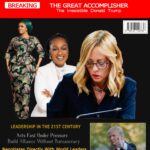
The Social Investment Fund (SIF) was set up in 1998 by the Government of Ghana (GoG), African Development Bank and the United Nations Development Programme as a rapid, reliable and flexible mechanism for channelling resources and delivering targeted assistance to both urban and rural impoverished communities.
The people of Ghana and Africans themselves represent one of the main driving forces for the economy.
It directly and indirectly, the total employment in Africa 2010-2021 Published by Mariam Sale, Jul 25, 2022.
In 2021, there were around 466 million people employed in Africa. The amount increased compared to the previous year, following a generally growing trend observed in the period under review.
In comparison, the number of people employed in 2010 was around 366 million. Estimates might not fully consider informal employment, which is widespread on the African continent. The employment was between manufacturing and non- manufacturing.
The sector is also world leader in terms of product innovation, and a strong force for innovation, constantly developing and furthering flexible and modular production systems, high-quality (premium) design alternative powertrain technologies and the management of complex value chains
However, the continent is experiencing increasing Africans without suitable work, especially in the areas of engineering, scientific, and soft skills.

This is due to several reasons, including ever-accelerating pace of technological change, non-sufficient planning of upskilling and retraining of Africad lack in development of higher technical education curricula, lack of awareness on existing job profiles, other drivers such as the poor image of Africa’s manufacturing sector in the eyes of young talent, as well as the ageing of the workforce.
To this end, the African Union needed to launch a program on Skills development.

Skills development for Africans was a common vision that addressed the needs in the African continent and strengthened the economic development.
THE KWAME NKRUMAH, DISABILITY, AND REHABILITATION IN GHANA, 1957-66* BY JEFF D. GRISCHOW Wilfrid Laurier University
This article examines a rehabilitation program for disabled Ghanaians developed by Kwame Nkrumah’s government between 1961 and 1966. Arising at a time when Nkrumah was moving away from welfarism in favour of a ‘big push’ for industrialization, rehabilitation sought to integrate disabled citizens into the national economy as productive workers.
Nkrumah’s program was preceded by a colonial rehabilitation project during the 1940s for disabled African soldiers.
The colonial initiative drew heavily on the British model of social orthopaedics, which equated citizenship with work. This philosophy resonated with Nkrumah’s vision of national development based on full employment.
Although its economic focus was in line with citizen’s welfare, Nkrumah’s rehabilitation program was unique among newly independent African states, and it arguably produced a positive legacy.

The keywords: Ghana, development, health, welfare.
Kwame Nkrumah’s economic policies have attracted much scholarly attention. The literature generally agrees that Nkrumah’s Convention People’s Party (CPP) shifted gears after 1961 to embrace a ‘big push’ towards state-led industrialization, after focusing on welfare and social services during the 1950s. No-one has noticed, however, that Nkrumah’s abandonment of welfarism coincided with a major rehabilitation program for disabled Ghanaians. The project began in late 1960, when Nkrumah invited John Wilson to survey the state of disability in Ghana and make new policies.
The project aims at supporting Africans in retaining key skills and acquiring new ones, in order to maintain and strengthen the competitive edge of the African industrialization program. For Africa to compete on a global market, and thus to contribute to the overall Blueprint skills strategy in every sector, it should have a separate project that focuses on the Africa’s member States, with the objective of collecting information on existing practices.

How can this goal be attained?

To attain this goal, the current document Nkrumah delivered about his vision to support and enhance the skills of Africans such as industrialization, technological, structural, societal and environmental.
The documents address the challenges to employment and skills in order to help industries, and in particular the African people themselves to increase their capacity, filling gaps and taking care of their own societies.

In terms of future skills demand, AssumptaGH conducted a research requesting for feedback on how many African mechanical engineers, architects, industrial engineers ect can Africa provide that represents Africa in terms of any natural disasters?

That reminds me of ( equality). What becomes more important, moreover, is not just having financial equality, but the wisdom to articulate the knowledge for more Africans to become engineers, scientists, and electronic engineers. This is what I consider as equality.

“Commitment” is the original idea we all need to view the lies and injustices deliberately put to Africans and its frameworks to turn Africans into consumers. I believe that new wisdom from the part of the OAU will indicate new paths that would turn Africans free to exhibit their inner creativity.
VALUE CREATION.
The idea of value creation was central to the philosophy of Tsunesaburo Makiguchi (1871–1944), first president of the Soka Gakkai; the name of the organization in fact means “society for the creation of value.” Makiguchi’s profoundly humanist outlookfocused on human happiness, responsibility and empowerment. lives on in the global Buddhist humanism of the Soka Gakkai today.
The terms value and value creation may invite confusion, especially with the idea of “values” in the sense of a moral standard. Value indicates that which is important to people, those things and conditions that enhance the experience of living. As the term is used in the Soka Gakkai, value points to the positive aspects of reality that are brought forth or generated when we creatively engage with the challenges of daily life.
Even what may seem at first sight to be an intensely negative situatio, like African’s poverty, financial woes or poor health can serve as an opportunity for the creation of positive value. A lifelong commitment to justice, for example, may arise from an early experience of having been wronged.
African leaders should enhance their abilities to see those possibilities, as well as the vitality, wisdom and persistence to realize them. Because we live our lives within networks of interrelatedness and interdependence, the positive value we create for ourselves is communicated and shared with others.
Thus, what started out as the inner determination of one individual to transform their circumstances can encourage, inspire and create lasting value within society.
This same progression from the inner life of the individual to the larger human community is seen in Makiguchi’s ordering of what he saw as the essential categories of value: beauty, gain and good.
Beauty indicates esthetic value, the positive sensory response evoked by that which we recognize as “beautiful.” Gain is what we find rewarding, in the broadest, most holistic sense; it includes but is not limited to the material conditions that make life more convenient and comfortable. Good is that which enhances and extends the well-being of an entire human community, making it a better and more just place for people to live.
Even prior to his conversion to Nichiren Buddhism in 1928, Makiguchi believed that the authentic purpose of life was happiness. As his practice and study of Buddhism deepened, Makiguchi began using the expression “the life of Great Good” to indicate a way of life dedicated to the highest value: the well-being of all humankind. This may be understood as a 20th-century reformulation of the age-old Buddhist ideal of the compassionate way of the bodhisattva.
It is also important to note that, unlike some of his contemporaries, Makiguchi rejected the idea that “the sacred” could be a form of value unto itself, and he asserted that human happiness was the authentic measure of religion. As he wrote: “Other than freeing people and the world from suffering, what meaning could there be for the existence of religion in society? Isn’t freeing people from suffering the value of gain? Isn’t freeing the world from suffering the moral value of good?”
The philosophy of value creation is thus a call to action as we are, where we are in the cause of human happiness. It is from the effort to orient our hearts toward a sublime objective that we gain the wisdom and energy to shape reality, at each moment, in the most value-creating ways. As Daisaku Ikeda states: “The key to leading a fulfilled life, free of regrets, is to dedicate ourselves to a cause, a goal that is larger than us.”
WATCH OUT FOR YOUR ASSUMPTAGH BIKINIS. Coming Soon.

















